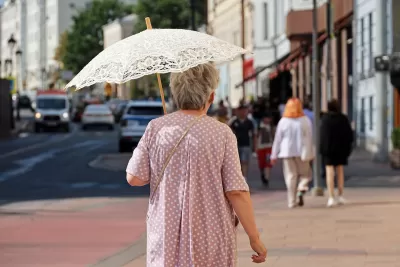People over 65 are at particular risk during heat waves and other climate disasters.

This summer, climate change is affecting American communities in unprecedented ways. In early July, 160 million Americans lived in areas where a heat advisory was in place, indicating dangerous temperatures and severely limiting outdoor activities. Millions of Texans are without power after Hurricane Beryl made landfall, leaving them ill-prepared to withstand the triple-digit temperatures that are expected to come. And Hurricane Beryl has already made history as the earliest-recorded Category 5 storm in the Atlantic on record, worrying scientists about the ferocity and scale of the seasonal hurricanes that will follow.
These stories make headlines, but rarely do they focus on what climate change means for the fastest-growing segment of our population: older adults. One hundred years ago, one in 20 people was over 65; today one in six is. And in just ten years, we’ll hit a demographic tipping point where the U.S. will have more seniors than children. But most communities don’t plan for the needs of their older population or take concrete steps to plan for their heightened climate risk.
Extreme weather events, fueled by climate change, are certain to have a disproportionately large effect on the health and well-being of people over 65. Past events — as far back as Hurricane Katrina (2005) and as recently as the Maui wildfires (2023) — reveal that older adults are two to four times likelier to die in climate-fueled disasters. That’s also true of heat waves, which are not traditionally considered “disasters:” 80 percent of the 12,000 heat-related deaths each year are among older adults. Older adults often live with pre-existing health conditions that exacerbate their risk, lack the ability or means to drive themselves out of harm’s way, live alone without on-demand support in times of crisis — or all three.
Climate change also contributes to financial and health setbacks that rarely get reported or even ascribed to climate change but have serious implications for older adults’ ability to safely age in place. Power outages can be particularly dangerous for those who rely on in-home oxygen machines or other medical equipment. Older adults without sufficient (or any) hazard insurance stand to lose a lifetime of savings when their homes are damaged in extreme weather and they lack the needed savings to rebuild. And for the 20 percent of older adults who don’t drive, extreme temperatures present real barriers to utilizing public transit, walking, or biking to meet daily needs or get medical care.
Smart communities recognize these patterns and take proactive steps to plan for extreme weather and an aging population. The smartest communities explicitly seek to reduce risk for older adults through community-scale resilience solutions that benefit people of all ages.
Case in point: the Pacific Northwest is once again experiencing historic levels of heat that bring to mind the deadly heat waves of 2021 in which 1000 people died, most of whom were older adults. In the most impacted county — Multnomah County, Oregon — the average age of people who died was 70. As I detail in my book, Climate Resilience for an Aging Nation, Portland leveraged its commitment to being an “age-friendly community” to pilot new solutions that helped older adults in the face of COVID and later extreme heat. Portland’s Clean Energy Benefits Fund deployed a new climate resilience program, Cooling Portland, to respond to low-income older adults’ needs. Launched in 2022, the program set out to install 15,000 portable heat pump cooling units over five years. The Fund prioritizes its free deployment (including installation) for low-income households that include a resident over 60 years of age. The program is now in its third year, having installed nearly 50 percent of the units to date and providing a critical lifeline for those most in need. Similar programs have begun to emerge in Houston, Baton Rouge, and Virginia, but large parts of the country remain unserved.
Planners play a critical role in protecting older adults from climate-fueled disasters and conditions. They can prioritize their needs in planning for housing, transportation, and infrastructure — both with an eye to serving more older adults over time and doing so in ways that reduce climate risks. That begins with identifying the older adults in a community, understanding their needs, and learning about the intersection between our greatest global environmental challenge and the daily health, mobility, and financial realities of our oldest residents.
The challenge is truly global, but the solutions, as evidenced by Portland, can and must be local. Planners can seize this moment in time to galvanize political support, educate community members, and enlist essential partners — including aging advocates — to build a more climate-resilient future in our aging world.
Danielle Arigoni is a policy and program expert in the fields of livable communities, affordable housing, and climate resilience. She has worked for more than 25 years in the federal government and nonprofit sectors in pursuit of more equitable, sustainable, and resilient places. She began her career as a Peace Corps volunteer in Kenya and has since led impactful and innovative teams at USAID, EPA, HUD, and AARP, currently serving as Managing Director of Policy and Solutions at National Housing Trust. She serves on the boards of Smart Growth America and the League of American Bicyclists. Her latest book is Climate Resilience for an Aging Nation.

Planetizen Federal Action Tracker
A weekly monitor of how Trump’s orders and actions are impacting planners and planning in America.

Congressman Proposes Bill to Rename DC Metro “Trump Train”
The Make Autorail Great Again Act would withhold federal funding to the system until the Washington Metropolitan Area Transit Authority (WMATA), rebrands as the Washington Metropolitan Authority for Greater Access (WMAGA).

The Simple Legislative Tool Transforming Vacant Downtowns
In California, Michigan and Georgia, an easy win is bringing dollars — and delight — back to city centers.

Albuquerque’s Microtransit: A Planner’s Answer to Food Access Gaps
New microtransit vans in Albuquerque aim to close food access gaps by linking low-income areas to grocery stores, cutting travel times by 30 percent and offering planners a scalable model for equity-focused transit.

This City Will Pay You to Meet Your Neighbors
A North Kansas City grant program offers up to $400 for residents to throw neighborhood block parties.

Commentary: Our Silence Will Not Protect Us
Keeping our heads down and our language inoffensive is not the right response to the times we’re in. Solidarity and courage is.
Urban Design for Planners 1: Software Tools
This six-course series explores essential urban design concepts using open source software and equips planners with the tools they need to participate fully in the urban design process.
Planning for Universal Design
Learn the tools for implementing Universal Design in planning regulations.
Smith Gee Studio
City of Charlotte
City of Camden Redevelopment Agency
City of Astoria
Transportation Research & Education Center (TREC) at Portland State University
US High Speed Rail Association
City of Camden Redevelopment Agency
Municipality of Princeton (NJ)





























